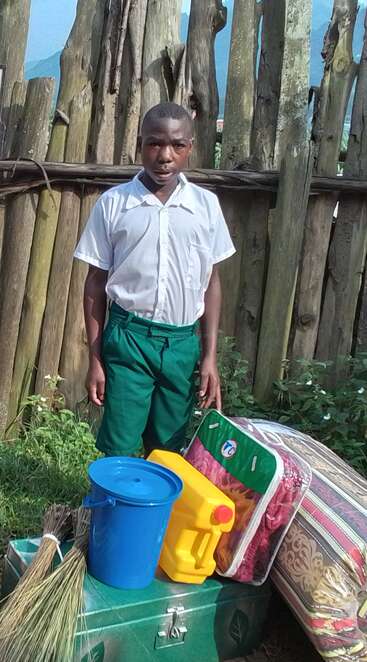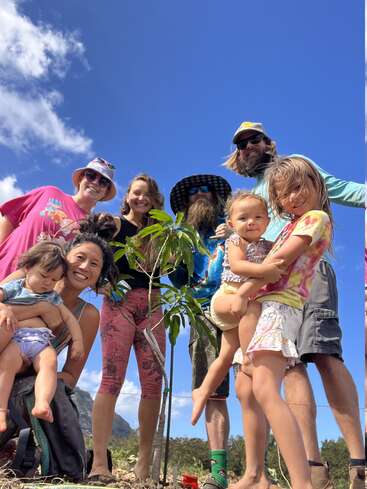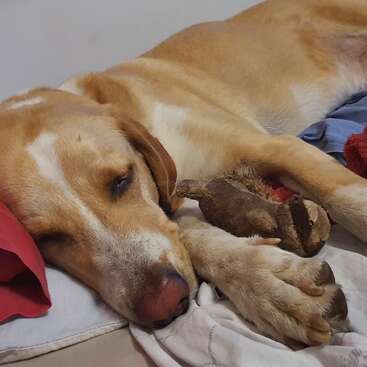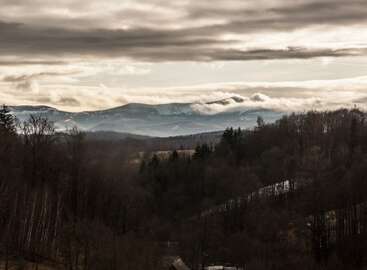Profilangaben

Host Bewertung
85 %

Letzte Antwort
28 Nov. 2025

Beantwortungsquote
100.0 %
Antwortet in der Regel innerh. 51 Tage

Feedback
-

ID verified

Verifizierte E-Mail
Abzeichen (2)


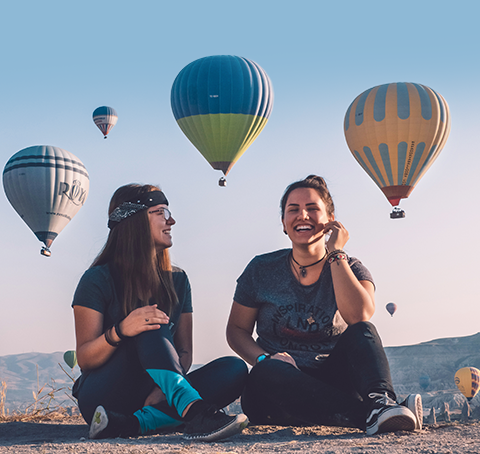
Finde deinen perfekten Gastgeber
Geforderte Mindest-Aufenthaltsdauer: mindestens 2 Wochen
Informationen

Beschreibung
Hi there, my name is Alex and I am one of the founders of an organisation advocating for Batwa rights and conducting grassroots projects in various Batwa settlements in Kisoro district, southwestern Uganda. I am a Mutwa myself and I am running this initiative with a team made of other fellow Batwa who got the privilege of receiving education and hence the opportunity to have a positive impact on the future of the Batwa.
The Batwa people are a socially marginalised group residing in southwestern Uganda, Rwanda, and the Democratic Republic of Congo. Originally, the Batwa people were hunter-gatherers and forest dwellers living at high elevations. Batwa’s core values are all to be associated with forests and natural elements. Natural resources were managed communally and sustainably so that they could be preserved and be Batwa's main source of physical, emotional, and spiritual wellbeing.
However, during the colonial period, the existing equilibrium originating from indigenous people’s worship and respect for nature was overturned. After the first Europeans reached Uganda in 1862 and declared it a British Protectorate in 1894, the colonial authorities established large areas of crown property in which local people were prohibited from entering and collecting resources. Forests were either torn down to make room for cash plantations, or transformed into game reserves and national parks. In this way, British colonisers introduced Uganda to the European concept of land ownership which entailed the monetization of natural resources.
Post-colonialist legislation did not transform colonialist policies after Uganda’s independence from the British Empire in 1962, which finally led to the eviction of the Batwa people from the Bwindi Impenetrable Forest in 1991. This eviction resulted in the utter alienation of local clans and communities from their main source of livelihood, as they were denied access to forests and oftentimes displaced without any compensation. The Batwa people in Uganda have faced difficulty in developing new livelihoods (e.g. learning how to practise agriculture) while still trying to preserve their traditional way of life. Issues such as alcoholism, school drop-outs, the spread of AIDS, sexual abuse, lack of hygiene, and social discrimination are very common.
Arten von Hilfe und Lernmöglichkeiten
Karitative Arbeit
Kunstprojekte
Sprachpraxis
Hilfe bei Ökoprojekten
Unterrichten
Gartenarbeiten
Heimwerker- und Bauarbeiten
Mithilfe auf einem Bauernhof
Zubereiten / Kochen von Mahlzeiten für die Familie
Hausarbeiten
Tourismus / Gastgewerbe
Hilfe mit Computer /Internet

UNO-Ziele für nachhaltige Entwicklung, die dieser Gastgeber verfolgt

Kultureller Austausch und Lernmöglichkeiten
We will ask you to volunteer up to five hours per day, five days per week. In your free time, you may decide to explore the natural beauty of Kisoro district – in particular Lake Mutanda, the Bwindi Impenetrable Forest, and Mount Muhabura among others – and socialize with the local Batwa to learn their culture and way of life, and possibly share yours.

Projekte mit Kindern
Dieses Projekt schließt möglicherweise den Umgang mit Kindern ein. Mehr Informationen findest du in unseren Verhaltensregeln und Tipps hier.

Arbeit
Would you like to get involved in the development of the Batwa people in Kisoro district, southwestern Uganda?
We have several projects taking place at this moment!
CONSTRUCTION AND MAINTENANCE WORK
Help us build mud houses or permanent houses for the Batwa people residing in unsafe improvised shelters in the various Batwa settlements in Kisoro district. Do you have any plumbing or electrician skills? Help us bring water closer to the Batwa villages and equip Batwa houses with electricity to improve their quality of life. We are seeking to enlarge our projects and organisation: your skills might also be required to extend our infrastructure, e.g., building classrooms for our Batwa School and Batwa Skill Development Centre.
TEACHING BATWA CHILDREN
Do you enjoy working with children? Help us develop English skills among the Batwa pupils and students to grant them a bright future allowing them to become the leaders of their own development in the upcoming years. You may also assist us in designing the best curriculum for the Batwa School we plan on building with the support of the educated Batwa who are part of our organisation.
This school will prioritize the dissemination of the Batwa indigenous knowledge and culture – including the recognition and correct use of forest medical plants, hunting and handcraft techniques, the traditional religion, songs, dances, tales, and customs – while making sure to teach worldwide relevant subjects such as English, Mathematics, Sciences, etc.
BATWA SKILL DEVELOPMENT CENTRE
Teach relevant skills and empower the Batwa who are not in school to allow them to become part of the job market in their area! Teach basic Mathematics for them to be able to count money, basic English for them to be able to have simple conversations with foreign visitors, and other skills you may have and that can be used to get a job. Are you a carpenter, an electrician, a plumber? Can you teach computer skills? Can you teach any art? Do you know how to produce soap or detergent out of natural ingredients? Please, join our Batwa Skill Development Centre and share!
AGRICULTURAL PROJECTS
Are you an agriculture expert? Teach the Batwa communities the best farming practices to enhance soil properties on the small plots of available land and help them achieve food security and economic self-sufficiency! Do you have knowledge and skills in livestock raising or beekeeping? Can you teach how to create compost, natural fertilizer and biogas out of organic waste? You can help the Batwa enhance their livelihoods in many ways!
AWARENESS CAMPAIGNS
Help us raise awareness on burning issues such as the importance of education, the transmission of HIV, family planning, and the side effects of alcohol. Since we value and respect the environment, our Volunteer Centre promotes waste sorting and recycling: help us raise awareness on the dos and don’ts concerning the management of both organic and inorganic waste.
MANAGING OUR SOCIAL MEDIA AND FUNDRAISING
Are you good at social media? Help us manage our Instagram and Facebook profiles to make our cause and projects known to as many people as possible. Assist us with starting successful fundraising campaigns to make sure the Batwa can enjoy a bright future.
Sprachen
Gesprochene Sprachen
Englisch: Gute KenntnisseDieser Gastgeber bietet Sprachaustausch an
Besides English, my team and I speak a few local languages, such as Rufumbira and Rukiga. I will be very happy to improve my English skills, as well as share knowledge about the other languages I speak.
Unterkunft
Our main office is located in Rubuguli, Kisoro district, Uganda. However, our volunteers stay at our Volunteer Centre located in Nteko’s Batwa settlement, Kisoro district, Uganda. We provide our volunteers with accommodation and three meals per day.
Volunteers may sleep in wooden huts that have been recently built. Mosquito nets, bed sheets, and blankets are provided. At this moment, our toilets are not flushing toilets, but in the future, we would love to implement them to enhance the comfort for our volunteers. Ugandan showers are available onsite: hot water can be provided by heating water using charcoal. Wi-Fi is currently not available; however, the area is covered by good network and 4G Internet, that is why we would recommend getting a Ugandan phone number. We are planning on bringing Wi-Fi to our Volunteer Centre in Nteko very soon!
Breakfast usually consists of coffee, black tea or milk, honey, bananas or other fruits, and chapati or other kinds of bread. Lunch and dinner consist of beans, g-nuts, and rarely meat accompanied with Irish potatoes, sweet potatoes, bananas, matoke (made of bananas), posho (made of white maize), yams, and cabbage. We grow many organic fruits and vegetables in our own garden which will be served to the volunteers and used to cook the meals for them. Therefore, we will be very happy to host volunteers following a vegetarian or vegan diet. In Nteko and the surrounding villages, you can find bottled water, as well as many shops for all your needs.
Was noch ...
TRANSPORTATION TO AND FROM NTEKO
To reach our Volunteer Centre in Nteko, you need to take a coach bus from Kampala, Uganda or Kigali, Rwanda to either Kisoro or Kabale. From these cities, there are several ways to reach us in Nteko.
- PUBLIC TRANSPORTATION from and to Nteko is quite limited and can be a bit uncomfortable, as it essentially consists of trucks. On the other hand, it is very cheap.
Nteko - Rubuguli - Kisoro – Mondays, Thursdays, Fridays: leaves at 8 am, reaches at 10 am
Kisoro - Rubuguli - Nteko – Mondays, Thursdays, Fridays: leaves at 2 pm, reaches at 4 pm
Nteko - Rubuguli - Kabale – Mondays, Saturdays: leaves at midnight, reaches at 6 am
Kabale - Rubuguli - Nteko – Mondays, Saturdays: leaves at 11 am, reaches at 5 pm
- The BODA-BODA is perhaps the most common means of transportation. It is essentially a moto-taxi. For short distances it is very convenient, however for longer distances it can be a bit uncomfortable.
Nteko - Rubuguli or Rubuguli - Nteko – (takes 30 minutes)
Nteko - Kisoro or Kisoro - Nteko – (takes 1 hour)
Nteko - Kabale or Kabale - Nteko – (takes 4 hours)
- The most convenient way of moving around is hiring a CAR driver.
Nteko - Rubuguli or Rubuguli - Nteko – (takes 40 minutes)
Nteko - Kisoro or Kisoro - Nteko – (takes 1:15 hours)
Nteko - Kabale or Kabale - Nteko – (takes 5 hours)
If you would like to travel to any nearby place and one of our team members is free, you can count on us for both transportation (on our motorbike) and touring: we will just ask you to cover the fuel expenses!
CLIMATE AND CLOTHING
Although it is very close to the Equator and hence characterized by tropical climate, Nteko is situated in a mountainous region at an altitude of 2,000 metres above sea level. This particular location makes its climate warm during the day (on average, 20 °C) and relatively cool during the night (on average, 10 °C). The warmest and coldest temperatures during the year are respectively 28 °C (in August) and 4 °C (in January). Uganda experiences two rainy seasons per year: from March to May and from September to December. Please, pack your luggage accordingly, considering the volunteering activities on the field you are going to carry out here. We recommend bringing – among others – mosquito repellents.
Etwas mehr Information

Internet Zugang

Eingeschränkter Internet Zugang

Wir besitzen Tiere

Wir sind Raucher

Familien möglich

Kann Digital Nomads unterbringen
Dieser Gastgeber nimmt gern Digital Nomads bei sich auf.

Platz zum Abstellen von Camper Vans
Dieser Gastgeber bietet Platz für Wohnmobile.

Hier sind Haustiere in der Regel willkommen
Dieser Gastgeber ist bereit, Reisende mit Haustieren bei sich aufzunehmen.

Kapazität - wie viele Workawayer maximal
mehr als zwei

Meine Tiere/Haustiere





